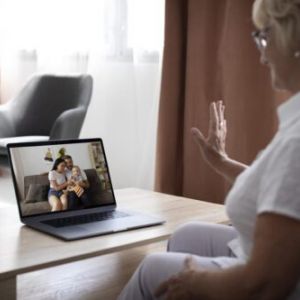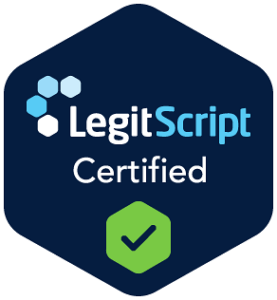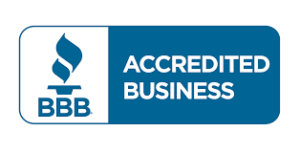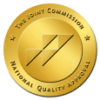Looking for flexible care without putting life on hold? Our Virtual/Online Rehab offers a structured, therapy-focused path you can attend from home anywhere in the state.
Through secure video sessions, you’ll meet with licensed clinicians, practice real-world skills, and stay accountable without commuting or disrupting work or school.
This is outpatient-level care delivered online, designed for people who are medically stable and ready to focus on recovery skills, routines, and support.
If you’re exploring virtual rehab Tennessee options, our team can help you understand whether telehealth is a good fit and map your next step in telehealth addiction treatment Tennessee. Start a private conversation today and see how virtual addiction treatment in Tennessee can work around your schedule and responsibilities.
What is Virtual / Online Rehab
Virtual/Online Rehab is an outpatient program often called virtual IOP or online IOP delivered through a secure telehealth platform. Instead of traveling to a clinic, you join scheduled sessions from a private space at home. Care typically includes:
- Individual therapy: goal-directed sessions that address cravings, stress, sleep, and relapse prevention skills.
- Group therapy: small, clinician-led groups that build coping skills, peer support, and accountability.
- Medication management (when clinically appropriate): coordination with a licensed prescriber to review medications that support recovery and mental health.
- Case management: help with referrals, documentation, and step-down planning.
Virtual care is structured and scheduled, not on-demand or emergency treatment. You’ll have set days and times each week, attendance expectations, and a treatment plan that’s reviewed and updated as you progress.
Sessions are conducted over encrypted video, and you’ll complete standard intake and consent forms before starting. You’ll be asked to attend from a quiet, private location with your camera on, as allowed, so your clinician can conduct a meaningful session.
Online addiction treatment Tennessee programs maintain clinical standards similar to in-person outpatient care: licensed providers lead sessions; evidence-based therapies guide the work; and participation, safety planning, and privacy practices are defined in writing.
If medication management is part of your plan, it is coordinated by appropriately licensed professionals and aligned with program policies and state regulations.
It’s also important to understand what virtual rehab is not.
Telehealth does not replace in-person detox or residential treatment when medical stabilization or 24-hour supervision is needed. Virtual IOP/OP is best suited for people who are medically stable, able to participate from a safe environment, and ready to practice recovery skills in daily life.
If you’re unsure where to start within virtual rehab Tennessee options or whether telehealth addiction treatment Tennessee is appropriate, an admissions screening can help determine fit and outline alternatives, including in-person levels of care.
Signs You May Need Virtual / Online Rehab in Tennessee
- Post-detox clients who’ve already completed medical stabilization and want to continue with therapy and support.
- Working professionals who need a predictable schedule and minimal commute disruption.
- Parents and caregivers who benefit from at-home access while managing family routines.
- College and graduate students are balancing classes, internships, and campus life.
- Individuals with mild-to-moderate substance use disorders (SUD) who can participate consistently from a stable environment and follow a treatment plan set by licensed clinicians.
- Medical and psychiatric stability. You should not need 24/7 monitoring, and any acute safety issues should be addressed before starting.
- Technology access. A reliable device, private space, and internet connection that supports secure video sessions.
- Safe, private setting at home. A location where you can attend with your camera on (as program policy allows) and engage without interruptions.
- Participation expectations. Attendance, openness to therapy, and collaboration with your care team.
- Medical detox or inpatient/residential care is needed for safety.
- There are acute safety concerns (e.g., uncontrolled withdrawal, imminent risk of harm) that require in-person evaluation and monitoring.
- You don’t have access to a private space or reliable technology to participate meaningfully.
If you’re unsure whether online rehab in Tennessee is right for you, an admissions screening can clarify current needs and suggest the safest level of care, including in-person options when needed.
Before your first session, you’ll complete a short orientation that covers digital etiquette and what makes telehealth work well. You’ll get clear guidance on where to sit, how to minimize distractions, and when to use the chat function versus speaking.
We also review attendance and rescheduling policies, so you always know what to do if a conflict or tech issue comes up.
Communication outside sessions is handled through the client portal or phone per program policy. Response times and availability are explained during onboarding.
You’ll choose your preferred contact methods for reminders and share a backup number in case your connection drops mid-visit.
Telehealth has unique privacy considerations. We’ll go over how to keep conversations private at home, when headphones are recommended, and why recording sessions isn’t permitted.
We also explain the limits of confidentiality (for example, mandated reporting and emergency safety concerns) in simple terms. At the start of each visit, you’ll confirm your physical location and an emergency contact so we can reach local services if a crisis arises.
Online rehab is designed for outpatient care. If symptoms, safety, or medical needs rise above what can be managed virtually, your clinician will discuss options and coordinate a step-up to an in-person level when appropriate. If you’re doing well and need fewer contacts, we’ll plan a step-down and revise your schedule.
You may complete brief check-ins or standardized questionnaires to help your team track sleep, stress, cravings, and functioning over time; results inform your plan. Simple accessibility supports like closed captions, larger text, or interpreter services may be available based on clinician tools and scheduling; ask admissions about current options.
If labs or primary care follow-up are part of your plan, your case manager can help identify local resources so coordination stays straightforward.
What Happens During Virtual Rehab in Tennessee?
Virtual care should feel organized, personal, and clinically sound. Here’s what you can expect in our online outpatient levels delivered by licensed professionals, coordinated as a team, and structured to help you build skills at home.
Licensed Therapists & Addiction Specialists
Your online care is led by licensed clinicians—such as LPCs, LCSWs, LMFTs, or equivalent—who provide therapy and coordinate with other members of your team.
When medication management is part of your treatment plan, a physician or psychiatric provider oversees prescribing and follow-up on the telehealth platform.
Nursing or medical support is coordinated according to program policies and clinical need.
Individual & Group Therapy
Therapy online is focused and practical.
- Individual sessions target the near-term issues that matter most: managing cravings, stabilizing sleep, creating a daily routine, addressing mood swings, and planning for high-risk moments (evenings, weekends, stressful deadlines). Your therapist helps you track triggers, practice coping tools, and set realistic goals for the week.
- Group sessions are clinician-facilitated and skills-based. You’ll learn and rehearse specific strategies like urge surfing, grounding techniques, cognitive reframes, and communication scripts while getting feedback and accountability from peers. Groups also cover psychoeducation topics like post-acute withdrawal syndrome (PAWS), how triggers form, and simple ways to reduce relapse risk (consistent meals, light movement, structured evenings).
- Between-session practice turns skills into habits. You and your therapist agree on short assignments—five-minute breathing routines, replacement activities for cue times, or sleep hygiene steps—so progress keeps moving between visits.
Dual Diagnosis Support
Substance use and mental health often interact; online care addresses both when clinically appropriate. [1]
- Screening and assessment identify symptoms of depression, anxiety, PTSD, and related concerns during intake and as care progresses.
- Coordinated therapy + medication evaluation: Your therapist and (when included) psychiatric provider align on a plan that supports mood, sleep, and safety. Medication decisions are individualized and reviewed on a regular basis; therapy reinforces non-medication strategies for emotion regulation and stress.
- Integrated planning ensures that what you practice in sessions like sleep routines, boundary-setting, grounding skills, matches any medication adjustments and your daily responsibilities at home, school, or work.
Family Therapy & Communication
When helpful and with your consent, family members or key supports can join select virtual sessions.
- Consent-driven participation: You decide who is involved and when.
- Education for loved ones: Clinicians explain what to expect from early recovery at home—typical PAWS symptoms, common triggers, and practical ways to support without taking over.
- Boundary-setting and roles: Short, solution-focused meetings help clarify communication (who calls when stress rises), logistics (rides to appointments, quiet study time), and safety steps if concerns escalate.
- Resource sharing: Families receive information about local and virtual support options and how to use the program’s communication channels appropriately.
Case Management & Coordination
A dedicated case management function keeps logistics clear so you can focus on treatment.
- Referrals: Coordinated connections to local therapists, primary care, lab services, or mutual-help meetings when indicated.
- School/work documentation (as appropriate): Letters confirming participation or outlining recommended schedule adjustments can be provided with your consent and in line with program policies.
- Step-down planning: From the start, your team discusses next steps like continuing IOP, transitioning to OP, adding community supports, or stepping up to in-person services if needs change. Warm handoffs reduce gaps that can disrupt progress.
- Insurance coordination: Admissions and case management can help with benefit verification and authorizations, so you understand coverage before you begin or change levels.
What this means for you: Online care brings licensed professionals, structured therapy, and coordinated planning into your home environment. You’ll know who is on your team, when you’ll meet, and how each session connects to a broader plan.
If circumstances shift, such as symptoms, schedules, or safety, your team will adjust cadence or recommend a different level of care and guide that transition.
Therapies Used in Virtual Rehab in Tennessee
Virtual outpatient care uses the same core, evidence-based approaches you’d expect in a clinic, delivered securely over video and adapted for the home environment. [2] Specific services are matched to your needs and scope of care; availability can vary by clinician licensure, training, and program policies.
CBT focuses on the link between thoughts, feelings, and actions. In telehealth, sessions are structured and goal-oriented:
- Cognitive skills: Identifying high-risk thinking (all-or-nothing, catastrophizing), testing assumptions, and generating balanced alternatives.
- Behavioral skills: Activity scheduling, behavioral activation for low mood, and graded exposure to triggers (e.g., evenings, loneliness, certain routes home).
- Relapse prevention tools: High-risk scenario mapping, “if-then” plans, and coping cards you can keep near your workstation or nightstand.
CBT fits telehealth well because worksheets, screen-shared exercises, and short between-session practices translate directly into daily routines at home.
DBT skills help you ride out intense emotions without acting on urges. Online groups and individual sessions often emphasize:
- Mindfulness: Noticing urges and body cues without judgment.
- Distress tolerance: Brief, practical tactics for crisis moments (paced breathing, cold water, grounding with the five senses).
- Emotion regulation: Sleep, nutrition, movement, and cognitive strategies that make strong feelings more manageable.
- Interpersonal effectiveness: Scripts for asking for help, saying no, and setting boundaries with roommates, partners, or coworkers.
In telehealth, DBT’s bite-sized homework and skills coaching are especially useful. They’re simple exercises you can do in minutes, then report back on next session.
Relapse prevention integrates education with planning so you know what to do when risk rises:
- Trigger identification: People, places, times of day, and emotional states that nudge use.
- Craving management: Urge surfing, 10-minute delay, counter-moves (hydration, brief walk, call/text support), and environment changes (rearranging your evening routine).
- Lifestyle foundations: Consistent sleep/wake, meal timing, light movement, and social connection, which are habits that reduce vulnerability to cues.
- Recovery capital: Building supports like peer groups, family agreements, transportation, and childcare that make follow-through realistic.
Telehealth makes RP practical: you plan in session, then immediately try the plan in your own home.
MI is a collaborative, non-confrontational style that helps you clarify goals and strengthen commitment to change:
- Explore ambivalence: Weigh the short-term draw of use against longer-term values (health, relationships, work).
- Elicit “change talk”: Identify your reasons to take the next step, in your words.
- Plan small moves: Convert motivation into one or two specific actions for the week.
MI pairs naturally with virtual care—brief check-ins can keep momentum going while you juggle school, work, or parenting.
Many people enter care with trauma histories. Trauma-informed principles shape telehealth delivery: [3]
- Safety & predictability: Clear session structure, plain-language explanations, and agreed-upon signals if you need a pause.
- Choice & pacing: You decide what to share and when; clinicians avoid unnecessary detail that could overwhelm.
- Body-based skills: Grounding, orientation to the room, breath work, and movement breaks help regulate the nervous system during video sessions.
TIC is not a specific technique; it’s a lens that ensures therapy proceeds at a tolerable pace and respects your boundaries.
Some clients may be offered adjunct approaches based on clinical fit and clinician training:
- EMDR via telehealth: Where program policy and licensure allow, Eye Movement Desensitization and Reprocessing can be delivered using secure bilateral stimulation tools adapted for video sessions. Suitability, readiness, and stabilization are assessed first; not everyone is a candidate for EMDR, and it may not be available in all cases.
- Skills-based psychoeducation: Short modules on sleep hygiene, PAWS (post-acute withdrawal syndrome), medication literacy, and managing digital triggers (newsfeeds, late-night scrolling).
- Mind-body practices: Brief, low-intensity practices (stretching, guided breath) integrated into sessions to reinforce regulation skills.
How These Approaches Fit Together Online
Your team collaborates on a plan that usually blends several of the modalities above:
- Assessment & goal setting: Identify priority symptoms (cravings, sleep, mood) and functional targets (work, school, parenting).
- Skills first, then depth: Stabilize daily routines and safety; add deeper work when you’re ready.
- Between-session practice: Short assignments (2–10 minutes) to build habits because repetition, not willpower, drives change.
- Review & refine: Track what helps, adjust the plan, and coordinate with medication management when part of care.
Availability of specific therapies depends on the clinician’s credentials, state regulations, and program scope. Your treatment plan will reflect what’s appropriate and accessible for you right now, and it can evolve as your needs change.
Insurance & Payment — Telehealth Rehab Coverage
Starting care shouldn’t be stalled by paperwork. We offer quick, confidential benefits verification so you know what your plan supports before you enroll. Many health plans include telehealth behavioral health benefits, but specifics like covered services, session limits, and costs depend on the individual policy. Our team reviews your coverage, explains the next steps in plain language, and helps you choose an affordable path.
What we verify for you:
- In-network / out-of-network status and how each affects your costs
- Deductible, coinsurance, and copay estimates for telehealth services
- Prior authorization requirements (when applicable) and how clinical reviews are submitted
- Any visit caps or care-management programs that apply to virtual IOP/OP
Plans we commonly check include: Aetna, Blue Cross Blue Shield of Tennessee, and UMR, along with other commercial plans. If your card lists a different Blue plan or employer-sponsored coverage, we will still verify—many policies recognize virtual outpatient services.
Important notes:
- Coverage and out-of-pocket costs vary by plan and benefit year.
- Final benefits are determined by your insurer; we provide estimates based on the information they share during verification.
- If your needs change (for example, a step-up to an in-person level of care), we can re-check benefits so you understand options.
If you’re comparing options for online rehab in Tennessee that accept insurance or want to confirm specifics like online rehab Tennessee Aetna, online rehab Tennessee BlueCross, or online rehab Tennessee Cigna, we’ll walk you through it privately and efficiently.
Why Choose Tennessee Detox Center for Virtual Rehab
Choosing a telehealth program is about fit, including clinical quality, scheduling that works for your life, and a plan that adapts as needs change. Our virtual services are delivered by licensed therapists, with coordinated psychiatry/medication management when clinically appropriate.
The focus is clear: structured therapy, practical skills, and steady support you can access from home anywhere in Tennessee.
Virtual care pairs clinical structure with practical flexibility, making it easier to start and stick with treatment. Whether you’re in a city or a rural area, virtual rehab Tennessee options can reduce barriers while keeping you connected to licensed clinicians and peers.
Key advantages of Virtual/Online Rehab in Tennessee:
- Privacy and discretion. Attend from a private space at home. Enrollment, scheduling, and sessions are handled through secure processes.
- Less travel, less time away. No commute means fewer logistical hurdles and more energy for therapy and daily routines.
- Work and school compatibility. Programs may offer daytime or evening tracks (availability varies and is confirmed at intake), helping you keep your job or course load on track.
- Access anywhere in TN. Statewide reach supports urban and rural clients alike, including those looking for virtual rehab Nashville resources or living elsewhere in Tennessee.
- Continuity of care when relocating. If you move within the state, telehealth can help maintain consistent therapy and medication follow-up without starting over.
- Family involvement without travel. With your consent, loved ones can join selected sessions remotely for education, boundary-setting, and support.
- Insurance and affordability: Many plans include telehealth and behavioral health benefits. Coverage varies by policy, but online rehab Tennessee accepts insurance inquiries, and they can be verified quickly, so you know what your plan supports before you start.
Virtual care doesn’t replace detox or residential treatment when those are clinically indicated. It does provide a realistic path to build recovery skills at home while staying engaged with your responsibilities, which is one reason many people exploring online rehab in Tennessee choose a telehealth format after stabilization.




- What to expect from our approach:
- Experienced, licensed clinicians who use evidence-based methods (CBT, DBT skills, relapse prevention, motivational interviewing) in a telehealth format that emphasizes safety, privacy, and clarity.
- Clear treatment planning from day one: goals tied to cravings, sleep, mood, and routines reviewed and adjusted as you progress.
- Attendance support and accountability appropriate to virtual IOP/OP, with straightforward expectations for participation and communication.
- Coordinated care when medication management is part of your plan. Therapy and prescribing are aligned, so strategies reinforce each other.
- Step down coordination to lighter care as you stabilize or step up to in-person services if symptoms, safety, or structure needs increase.
- Aftercare planning built in: relapse-prevention routines, community meeting options (including virtual), and referrals close to home so support continues after the program.
Telehealth is most effective when it’s integrated—not isolated. If higher structure is needed, we help connect you with in-person levels of care; if you’re thriving and ready to scale down, we plan that transition with you. This continuity is why many people exploring virtual rehab Tennessee options choose a program that can flex with real life and keep progress moving.
If you’re evaluating virtual addiction treatment in Tennessee for yourself or someone you support, we’re glad to outline schedules, verify insurance, and map a realistic first month of care so you can make an informed choice and get started with confidence.
Inpatient vs Outpatient Virtual Online Rehab
Where virtual IOP/OP fits after stabilization:
Virtual care begins once you’re medically stable and able to participate from a private, safe environment. Many people step into IOP (Virtual/Online) directly after PHP or Residential, using the structure of multiple sessions per week to build daily routines, practice coping skills, and stay closely connected to licensed clinicians.
As symptoms settle and skills strengthen, you can transition to OP either Virtual/Online or in person while maintaining consistent touchpoints for therapy and (when included) medication follow-up.
Smooth transitions and warm handoffs:
From the outset, your team plans the next step so there’s no gap in support. When you move levels (for example, PHP→ IOP or IOP → OP], your clinician provides a concise clinical summary, safety plan, and scheduling details so you don’t repeat your story.
Case management coordinates logistics, including insurance verification, appointments, and documentation for work or school as appropriate, so you can focus on treatment rather than paperwork.
Collaboration with in-person providers when needs change:
If your situation calls for more structure or medical oversight, your team will recommend a step-up (e.g., in-person PHP or Residential, or return to Detox if clinically indicated) and coordinate the transition.
If you’re ready to scale down, we plan a step-down to OP with clear goals, session cadence, and community support. The aim is continuity: the same priorities you work on virtually—sleep, cravings, mood, routines—carry forward at each level, culminating in a practical Aftercare plan and relapse-prevention roadmap.
Why this matters:
A mapped continuum reduces missed appointments, protects early gains, and makes it easier to keep momentum as life gets busier. Virtual IOP/OP sits in the middle of that path. It’s structured enough to support change, flexible enough to fit real life, and connected to higher or lower levels of care when needed.
How the Continuum Fits Together
Many clients start with detox if needed, move into Residential, then step to PHP, IOP, and OP/Aftercare as stability improves. Others begin in PHP or IOP when home is safe and symptoms are manageable.
Wherever you start, the plan is coordinated so you don’t have to rebuild your team at every step. If you’re comparing kratom rehab options in Tennessee, look for this continuity. It’s what turns a tough month into sustained progress within a realistic kratom recovery program.

Aftercare & Relapse Prevention
Treatment is a launchpad. Before you complete virtual care, you’ll leave with a written relapse prevention plan and a clear set of next steps tailored to your life.
Your plan includes:
- Crisis contacts: Who to call (program numbers, local crisis lines), where to go, and how to signal for help during a spike in risk.
- Coping routines: Sleep/wake anchors, simple nutrition guidelines, and brief movement you can sustain, plus specific “if-then” scripts for cravings and high-risk times.
- Trigger map & counter-moves: People, places, and times of day that raise risk, paired with replacement behaviors and boundaries.
Staying connected:
- Alumni check-ins: Short, scheduled touchpoints to review wins, troubleshoot stressors (holidays, travel, anniversaries), and refresh skills.
- Peer support: Where available, virtual alumni groups keep momentum going; we also link you to community meetings, including AA/NA, SMART Recovery, Refuge Recovery, with options near home and online.
- Local referrals across Tennessee: Therapists, prescribers, and support resources in Middle, East, and West TN, plus tele-options for continuity if you move or travel.
Continuity matters: If your needs change, we’ll coordinate a transition to a different level (virtual or in-person) to avoid gaps in care.
Virtual Rehab Program Schedule
Virtual schedules are designed to be predictable and manageable. Exact times are confirmed during intake and may vary by location, clinician availability, and holidays, but the cadence below shows what a typical week can look like.
Virtual IOP — Example Weekly Cadence (multiple days/week):
Mon, Wed, Thu:
- Group Therapy (90–120 min) — skills practice (CBT/DBT tools, relapse prevention), peer feedback, weekly theme
- Short Break (10–15 min)
- Group or Psychoeducation (45–60 min) — PAWS, sleep routines, trigger planning
One Individual Session (30–50 min) — scheduled during the week for goal review, personalized coping plans
Medication Management (as included) — prescriber visit at clinically appropriate intervals
Virtual OP — Example Weekly Cadence (fewer contacts):
- 1 Group Session (60–90 min) — continued skills and accountability
- 1 Individual Session (30–50 min) — targeted work on cravings, mood, or routines
- Medication Follow-Up (as included) — brief check-ins per your plan
Time-of-day options:
Programs may offer daytime or evening tracks. Availability is confirmed during admissions; we’ll help you choose a schedule that aligns with work, classes, parenting, and commute patterns (if you also attend in-person services).
Participation expectations for effective telehealth:
- Camera on (as program policy allows), so clinicians can conduct a meaningful session
- Private setting with minimal distractions; headphones recommended
- Materials ready (notebook, water, any worksheets shared via the portal)
- Tech backup plan (charger connected; phone hotspot or alternate device if your primary connection drops)
- Punctuality & attendance — consistent participation is part of treatment success and helps keep groups cohesive
Your exact schedule will be set during intake based on clinical recommendations and availability. If your needs change, such as more structure or less, the cadence can be adjusted, or we’ll coordinate a step-up/step-down across IOP, OP, or in-person levels to keep care aligned with your goals.
Your care happens on a secure, encrypted video platform with HIPAA-aligned processes for scheduling, documentation, and messaging. Before your first session, we complete a brief tech check to confirm your device (computer or tablet preferred), camera, microphone, and internet connection meet minimum requirements for clear audio and video.
Privacy practices are built into every step. You’ll be asked to attend sessions from a confidential space where you won’t be overheard or interrupted. Simple tips help: use headphones, close the door, silence notifications, and position your camera at eye level so clinicians can read facial cues. If others are at home, consider a white-noise machine or fan outside the door for added discretion.
We provide basic tech support for common issues (audio, video, connectivity) and recommend a stable broadband connection, a plugged-in power source, and a backup plan (e.g., mobile hotspot or alternate device) in case your primary connection drops. Screen-sharing is used for worksheets or skill drills when appropriate; you can also access materials through the client portal.
As part of onboarding, you’ll review and sign consent forms, acknowledge telehealth policies, and complete identity verification so your clinical record is accurate and secure. We also confirm a physical location for each session and emergency contacts to support crisis planning.
These steps help ensure your experience is private, compliant, and clinically effective, just like an in-person visit, adapted for home.
Why Choose our Virtual Rehab in Tennessee?
You can access care statewide, whether you’re seeking virtual rehab Nashville options or broader online rehab Tennessee services. Our telehealth programs serve clients across Middle, East, and West Tennessee, with schedules designed to fit work, school, and family routines.
- Middle Tennessee: Nashville, Franklin, Murfreesboro, Clarksville
- East Tennessee: Knoxville, Chattanooga and surrounding communities
- West Tennessee: Memphis and nearby areas
When your plan includes services that are easier to complete locally, we help coordinate referrals, for example, to primary care, labs, or community supports. Your case manager can provide meeting lists (AA/NA, SMART Recovery, Refuge Recovery), therapy referrals close to home, and information about virtual options if travel is a barrier.
Some clients transition between virtual and in-person levels of care over time. If you step up to a clinic-based service later, our site’s Google Maps with Directions integration makes it simple to locate facilities and plan the route.
Regardless of where you live, the goal is the same: keep treatment consistent, practical, and connected to resources you can actually use.
Whether you’re in a major metro or a smaller town, virtual rehab Nashville and statewide online rehab Tennessee access allow you to attend therapy from a private space at home without the commute while staying linked to licensed clinicians, peers, and community support.

Family Support (Involving Loved Ones Online)
Recovery is easier when the people around you understand what helps. In our virtual model, family sessions are consent-based. You decide who participates and when.
Sessions are scheduled over secure video and typically focus on communication, realistic expectations for early recovery at home, and simple ways to support progress without taking over.

How virtual family sessions work:
- Goal-setting first: You and your clinician identify what you want from family involvement (e.g., clearer evening routines, support during cravings, transportation to appointments).
- Participation by invitation: Loved ones receive a secure link and brief orientation to telehealth etiquette (camera on, private space, one speaker at a time).
- Short, solution-focused meetings: Clinicians facilitate specific agreements you can use right away, like check-in times, quiet hours, or who to call if stress spikes.

Education that makes a difference:
- Boundaries & roles: What supportive accountability looks like (offers, not ultimatums), and how to avoid common pitfalls like arguing during cravings.
- Relapse warning signs: Sleep disruption, isolating, skipping sessions, or renewed contact with high-risk people/places, plus clear steps to take if these show up.
- Self-care for families: Guidance on support groups and realistic limits to protect everyone’s wellbeing.
- Resource packets & meeting lists: Families receive curated materials—PAWS basics, communication scripts, safety planning tips—and local/virtual meeting lists (AA/NA, SMART Recovery, Refuge Recovery).
Tennessee Detox Center Amenities (For In-Person Transitions)
If your care plan shifts to an in-person level (step-up or step-down), it helps to know what’s on site. This section provides a brief orientation so you can plan logistics without interrupting treatment.
What to expect (informational overview):
- Therapy spaces: Private rooms for individual sessions and structured group rooms for skills practice.
- Quiet areas: Low-stimulation spaces for rest between sessions when applicable.
- Medication & nursing access: On-site support according to program level and clinical need.
- Practical details: Parking, arrival/check-in steps, and what to bring (ID, medications in original containers, comfortable clothing).
Start Virtual Online Rehab at Tennessee Detox Center

Call or message us

Free assessment

Insurance check

Choose a start date
What to prepare: a private space, headphones, a reliable internet connection, your emergency contacts, and a charger. If you need help with setup, we’ll walk you through it so day one feels smooth and predictable.
FAQs about Virtual Rehab in Tennessee
Virtual IOP (Intensive Outpatient Program) meets multiple days per week with several hours of group and individual therapy, offering more structure and frequent contact with your care team. Virtual OP (Outpatient) meets less often, focusing on maintenance skills, accountability, and medication follow-up when included. Many people step down from IOP to OP as cravings stabilize and routines solidify.
Virtual care works best for people who are medically and psychiatrically stable, can join sessions from a private setting, and have reliable technology (device, camera, internet). It’s often a fit for post-detox clients, working professionals, parents/caregivers, and students. Your screening will confirm safety needs and recommend the right level, whether that’s virtual IOP/OP, in-person care, or a different step on the continuum.
Yes, programs are designed for access across Tennessee. You’ll confirm residency and location at each visit, and you’ll need a stable connection plus a camera-enabled device. If you’re weighing options for online alcohol rehab in Tennessee or online drug rehab in Tennessee, admissions can outline schedules that match your time zone, job, and family routines.
When clinically appropriate, yes. A licensed prescriber coordinates medication management (for mental health or substance use treatment) within program policies. Appointments are scheduled over secure video, and follow-ups are arranged at clinically suitable intervals. Medication decisions are individualized; not every client requires medication, and availability depends on licensure and scope.
Sessions run on a secure, encrypted platform with HIPAA-aligned processes. You’ll join from a confidential space with your camera on (as policy allows). Headphones, closed doors, and silenced notifications help. You’ll complete telehealth consent, identity verification, and provide a physical location and emergency contacts for each session as part of safety planning.
Many plans cover telehealth behavioral health. Coverage varies by policy, so we provide quick, confidential benefits checks and explain costs before you start. We commonly verify Aetna, Blue Cross Blue Shield of Tennessee (BCBS TN), Blue Cross Blue Shield of Texas (BCBS TX), Cigna, and others. If you’re comparing online rehab Tennessee accept insurance options, we’ll confirm network status, any prior authorization, and estimated out-of-pocket costs.
Your team will coordinate a step-up to in-person services if symptoms, safety, or structure needs exceed what telehealth can provide (e.g., PHP, residential, or medical evaluation). We complete warm handoffs so you don’t lose momentum or repeat your story.
[1] National Library of Medicine. (n.d.-a). Dual diagnosis. https://medlineplus.gov/dualdiagnosis.html
[2] Treatment Methods & Evidence-Based Practices. (n.d.). National Association of Addiction Treatment Providers. https://www.naatp.org/treatment-methods-evidence-based-practices
[3] What is Trauma-Informed Care? – Trauma-Informed Care Implementation Resource Center. (2022, July 7). Trauma-Informed Care Implementation Resource Center. https://www.traumainformedcare.chcs.org/what-is-trauma-informed-care/

Medically Reviewed By:
Dr. Vahid Osman, M.D.
Board-Certified Psychiatrist and Addictionologist
Dr. Vahid Osman is a Board-Certified Psychiatrist and Addictionologist who has extensive experience in skillfully treating patients with mental illness, chemical dependency and developmental disorders. Dr. Osman has trained in Psychiatry in France and in Austin, Texas. Read more.

Clinically Reviewed By:
Josh Sprung, L.C.S.W.
Board Certified Clinical Social Worker
Joshua Sprung serves as a Clinical Reviewer at Tennessee Detox Center, bringing a wealth of expertise to ensure exceptional patient care. Read More
The Joint Commission – The Gold Seal of Approval® signifies that Tennessee Detox Center meets or exceeds rigorous performance standards in patient care, safety, and quality. It reflects a commitment to continuous improvement and clinical excellence.

LegitScript Certified – Confirms that Tennessee Detox Center operates in full compliance with laws and regulations, and meets high standards for transparency and accountability in addiction treatment marketing.

BBB Accredited – Demonstrates ethical business practices, commitment to customer satisfaction, and a trusted reputation within the community.
Psychology Today Verified – Indicates that Tennessee Detox Center is listed on Psychology Today, a trusted directory for verified mental health providers and treatment centers.
HIPAA Compliant – Ensures all patient health information (PHI) is protected and managed in accordance with strict federal privacy and data security standards.
ASAM Member – Tennessee Detox Center is a proud member of the American Society of Addiction Medicine (ASAM), reflecting a commitment to science-driven and evidence-based treatment standards.

Rutherford County Chamber of Commerce – Membership signifies active participation in the local community and support for regional growth and civic collaboration.
Get Family Support Now
Supporting Families Through Recovery
We understand addiction affects the whole family. Our comprehensive family program helps rebuild trust and restore relationships.
Weekly Family Therapy Sessions
Educational Workshops
Support Groups
Communication Skills Training
All content published on Tennessee Detox Center website pages is provided for informational purposes only and should not be interpreted as medical, psychological, or legal advice. This information is not intended to diagnose, treat, cure, or prevent any disease or condition and should not replace consultation with licensed healthcare professionals.
Addiction is a chronic, relapsing medical condition that requires individualized care. Treatment approaches, detox protocols, and rehabilitation services vary depending on numerous factors unique to each individual. No information on this website should be relied upon to make treatment decisions without professional guidance.
If you are experiencing an emergency situation, including overdose, withdrawal complications, suicidal ideation, or immediate risk to yourself or others, call 911 immediately. Tennessee Detox Center does not provide emergency medical services online or via website communication.
Never attempt to discontinue substance use or begin detox without proper medical supervision. Withdrawal can cause serious medical complications. Any information regarding detoxification is general in nature and does not substitute for physician-directed care.
Insurance information presented on this website is intended solely to assist users in understanding potential coverage options. Coverage is subject to verification, medical necessity determinations, and policy limitations. Tennessee Detox Center encourages direct contact with our admissions specialists to confirm benefits and eligibility.
We do not guarantee treatment outcomes, length of stay, insurance approvals, or placement availability. Outcomes depend on numerous clinical and personal factors.
External links are provided for convenience and informational purposes only. Tennessee Detox Center assumes no responsibility for third-party content or practices.
Use of this website does not establish a doctor-patient or therapist-patient relationship. Recovery requires professional support and individualized care.
The content available on Tennessee Detox Center pages is designed to provide educational information related to addiction, detoxification, rehabilitation, and recovery. This information should not be interpreted as professional medical advice or treatment recommendations.
Addiction treatment is highly individualized. Detox and rehab needs vary significantly based on health history, substance use patterns, and mental health considerations. Information provided is general and may not apply to all individuals.
If an emergency arises — such as overdose, severe withdrawal symptoms, or immediate danger — call 911 without delay. Online resources are not a substitute for emergency medical care.
Medical detox should always be conducted under professional supervision. Attempting detox without medical oversight can be dangerous.
Insurance information is provided as general guidance only. Coverage varies by plan and carrier. Tennessee Detox Center encourages all individuals to verify benefits directly with admissions staff.
Recovery outcomes are not guaranteed. Treatment effectiveness depends on many factors including engagement, clinical needs, and aftercare support.
References to external resources do not imply endorsement. Tennessee Detox Center is not responsible for third-party content.
Website use does not establish a provider-patient relationship.
[1] National Library of Medicine. (n.d.-a). Dual diagnosis. https://medlineplus.gov/dualdiagnosis.html
[2] Treatment Methods & Evidence-Based Practices. (n.d.). National Association of Addiction Treatment Providers. https://www.naatp.org/treatment-methods-evidence-based-practices
[3] What is Trauma-Informed Care? – Trauma-Informed Care Implementation Resource Center. (2022, July 7). Trauma-Informed Care Implementation Resource Center. https://www.traumainformedcare.chcs.org/what-is-trauma-informed-care/

Medically Reviewed By:
Dr. Vahid Osman, M.D.
Board-Certified Psychiatrist and Addictionologist
Dr. Vahid Osman is a Board-Certified Psychiatrist and Addictionologist who has extensive experience in skillfully treating patients with mental illness, chemical dependency and developmental disorders. Dr. Osman has trained in Psychiatry in France and in Austin, Texas. Read more.

Clinically Reviewed By:
Josh Sprung, L.C.S.W.
Board Certified Clinical Social Worker
Joshua Sprung serves as a Clinical Reviewer at Tennessee Detox Center, bringing a wealth of expertise to ensure exceptional patient care. Read More
The Joint Commission – The Gold Seal of Approval® signifies that Tennessee Detox Center meets or exceeds rigorous performance standards in patient care, safety, and quality. It reflects a commitment to continuous improvement and clinical excellence.

LegitScript Certified – Confirms that Tennessee Detox Center operates in full compliance with laws and regulations, and meets high standards for transparency and accountability in addiction treatment marketing.

BBB Accredited – Demonstrates ethical business practices, commitment to customer satisfaction, and a trusted reputation within the community.
Psychology Today Verified – Indicates that Tennessee Detox Center is listed on Psychology Today, a trusted directory for verified mental health providers and treatment centers.
HIPAA Compliant – Ensures all patient health information (PHI) is protected and managed in accordance with strict federal privacy and data security standards.
ASAM Member – Tennessee Detox Center is a proud member of the American Society of Addiction Medicine (ASAM), reflecting a commitment to science-driven and evidence-based treatment standards.

Rutherford County Chamber of Commerce – Membership signifies active participation in the local community and support for regional growth and civic collaboration.
Holistic Detox Services
Compassionate Rehab Services
Evidence-Based Treatment
Get Family Support Now
Supporting Families Through Recovery
We understand addiction affects the whole family. Our comprehensive family program helps rebuild trust and restore relationships.
Weekly Family Therapy Sessions
Educational Workshops
Support Groups
Communication Skills Training
What Our Patients Say: Stories of Hope and Recovery
Hear directly from those who have walked the path to recovery. Our patients’ stories highlight the compassionate care, effective programs, and life-changing support they’ve experienced. Let their journeys inspire you as you take your first steps toward healing.










Thank you all so much!




















The facility itself is clean, well-maintained, and equipped with all the necessary amenities to provide a serene and supportive environment.
What truly stands out is the personalized approach to care. The team developed a treatment plan tailored to my specific needs, incorporating both medical and holistic therapies. This comprehensive approach not only addressed my physical withdrawal symptoms but also supported my mental and emotional well-being.
The counselors and therapists offer a range of therapies that helped me understand the root causes of my addiction and develop effective coping strategies. Group therapy sessions provided a safe space to share experiences and gain insights from others on similar journeys.
Overall, my experience with this medical detox program was life-changing. The compassionate and skilled staff, combined with the personalized treatment approach, provided me with the foundation I needed for a successful recovery. I highly recommend this facility to anyone seeking a safe and supportive environment for detox and recovery.
But it's the people who make this place truly special. The staff, they've been there, they understand the struggle. No judgment, just support, encouragement, and a genuine desire to help you heal. They treated me like an old friend, even though I was just visiting for my buddy.
They've got a whole range of therapies to help you on your journey – individual counseling, group sessions, and even a fitness center to get you moving again. It's not just about detox. It's about rebuilding your life from the ground up.
My friend, the owner, he's living proof that this place works. He poured his heart into creating a haven for those seeking recovery, and his passion shines through in every detail.
So, if you're ready to take that first step, this is the place. Trust me, they'll walk beside you every step of the way.



